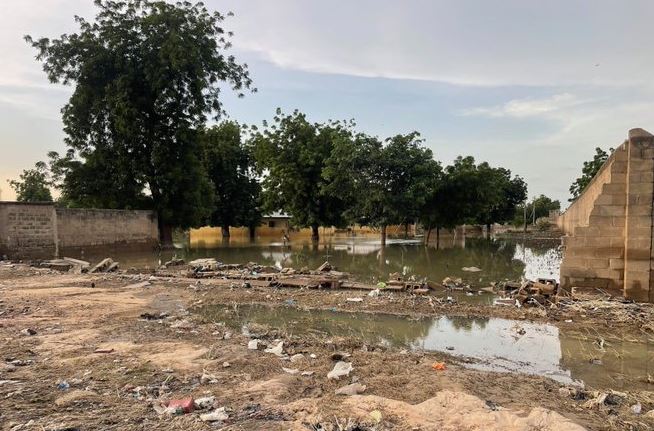Flooding in northeastern Nigeria has caused the escape of nearly 300 prisoners after torrential rain led to the collapse of prison walls in Maiduguri, Borno State. According to the Nigeria Correctional Services, 281 inmates fled when the floodwaters damaged the Medium Security Custodial Centre and staff quarters early last week.
Umar Abubakar, spokesperson for the correctional services, confirmed that seven of the escapees have been recaptured in ongoing operations. Efforts to locate the remaining fugitives are continuing, he said in a statement on Sunday.
The region has been hit by its worst flooding in decades, triggered by a dam breach following heavy rainfall. The disaster has also displaced thousands of residents, washed dangerous wildlife into communities, and claimed the lives of over 30 people. The floods, which have affected around one million people, pose serious risks of waterborne disease as aid agencies struggle to provide sufficient medical care to those impacted.
Borno State, the epicenter of the Boko Haram insurgency, is facing compounded challenges as the floodwaters have exacerbated an already dire humanitarian crisis. Many displaced residents are now living in camps without access to clean water or adequate food supplies. In addition to the immediate health concerns, authorities are warning of the strain on government resources and the growing pressure on aid organizations.
“The situation in the Sahel and Lake Chad region is increasingly dire, as the compounding effects of conflict, displacement, and climate change take a severe toll on vulnerable populations,” said Hassane Hamadou, regional director for the Norwegian Refugee Council (NRC).
The floods in Maiduguri are part of a wider pattern of severe weather in West and Central Africa, which has displaced more than 1.5 million people across 12 countries in August alone, according to the United Nations. The floods have also caused significant damage in neighboring countries including Cameroon, Chad, and Niger, all of which are located in the drought-prone Sahel region.
In Maiduguri, residents are struggling to access medical care. In one camp, Bintu Amadu described waiting for hours to receive treatment for her son’s diarrhea, while many others, like Ramatu Yajubu, expressed frustration over the limited healthcare services. “I’ve been waiting for days, and even though I got an appointment card, I’m still uncertain if we’ll be seen,” she said.
Doctors Without Borders (Médecins Sans Frontières) field coordinator Mathias Goemaere explained that the region had already been facing high rates of malnutrition due to years of conflict. “What we’re seeing now is an increase in waterborne diseases like diarrhea and malaria, especially as people’s immune systems are weakened by malnutrition,” Goemaere told Reuters.
The Nigerian government has also issued warnings about rising water levels in the Benue and Niger rivers, which could result in further flooding in the southern Niger Delta region. With ongoing efforts to manage the aftermath of the floods in Borno and beyond, authorities are bracing for the long-term impacts of this natural disaster.
The flooding has already taken the lives of at least 30 people and displaced hundreds of thousands, highlighting the urgent need for coordinated humanitarian relief efforts across the affected regions.
Key Points
- Prison Escape: Nearly 300 prisoners (281 inmates) escaped from a jail in Maiduguri, northeastern Nigeria, after floods caused the walls to collapse. Seven inmates have been recaptured so far.
- Flood Devastation: The floods in Borno State, the worst in decades, were triggered by a dam overflow following heavy rains, affecting around one million people and displacing thousands.
- Humanitarian Crisis: The flooding has compounded the region’s ongoing humanitarian crisis, with aid agencies warning of outbreaks of waterborne diseases such as diarrhea and malaria, especially among malnourished populations.
- Casualties and Displacement: Over 30 people have been killed by the floods, and more than 1.5 million people have been displaced across 12 countries in West and Central Africa in the past month.
- Health and Aid Struggles: Residents in flooded areas, particularly in camps for displaced people, are struggling to access medical care. Aid agencies and health services are overwhelmed by the number of people in need of assistance.
- Wildlife Threat: The floods have washed dangerous animals like crocodiles and snakes into communities, increasing the risk to human life.
- Broader Impact: The Nigerian government has warned of further potential flooding in the Niger Delta region due to rising water levels in major rivers like the Benue and Niger.



